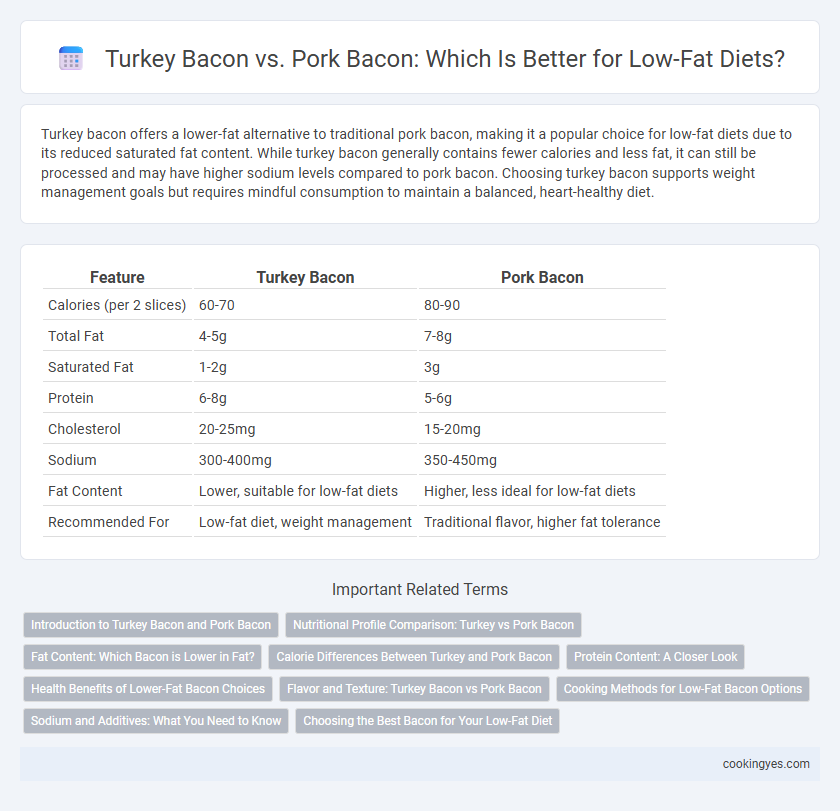Turkey bacon offers a lower-fat alternative to traditional pork bacon, making it a popular choice for low-fat diets due to its reduced saturated fat content. While turkey bacon generally contains fewer calories and less fat, it can still be processed and may have higher sodium levels compared to pork bacon. Choosing turkey bacon supports weight management goals but requires mindful consumption to maintain a balanced, heart-healthy diet.
Table of Comparison
| Feature | Turkey Bacon | Pork Bacon |
|---|---|---|
| Calories (per 2 slices) | 60-70 | 80-90 |
| Total Fat | 4-5g | 7-8g |
| Saturated Fat | 1-2g | 3g |
| Protein | 6-8g | 5-6g |
| Cholesterol | 20-25mg | 15-20mg |
| Sodium | 300-400mg | 350-450mg |
| Fat Content | Lower, suitable for low-fat diets | Higher, less ideal for low-fat diets |
| Recommended For | Low-fat diet, weight management | Traditional flavor, higher fat tolerance |
Introduction to Turkey Bacon and Pork Bacon
Turkey bacon offers a lower fat content compared to traditional pork bacon, making it a popular choice for low-fat diets. While pork bacon contains higher levels of saturated fat and calories, turkey bacon provides a leaner alternative with protein often derived from turkey thigh meat. Both types retain a distinctive smoky flavor, though turkey bacon typically has less grease and a slightly different texture, aligning with healthier eating preferences.
Nutritional Profile Comparison: Turkey vs Pork Bacon
Turkey bacon contains significantly less fat and fewer calories compared to pork bacon, making it a popular choice for low-fat diets. Pork bacon averages around 42 grams of fat and 290 calories per 100 grams, whereas turkey bacon typically has 7 to 10 grams of fat and about 120 calories per 100 grams. The lower saturated fat content in turkey bacon contributes to better heart health and aligns with dietary recommendations for reduced fat intake.
Fat Content: Which Bacon is Lower in Fat?
Turkey bacon contains significantly less fat than traditional pork bacon, making it a preferred choice for low-fat diets. On average, turkey bacon has about 2 to 3 grams of fat per slice, while pork bacon can contain 4 to 6 grams or more. Selecting turkey bacon helps reduce overall fat intake without sacrificing the savory flavor of bacon.
Calorie Differences Between Turkey and Pork Bacon
Turkey bacon typically contains significantly fewer calories than pork bacon, making it a popular choice for low-fat diets. On average, turkey bacon has about 30-50 calories per slice, whereas pork bacon can have 40-70 calories per slice, depending on the cut and preparation. Choosing turkey bacon helps reduce overall calorie intake while still providing a similar savory flavor in meals.
Protein Content: A Closer Look
Turkey bacon typically contains lower fat and fewer calories than pork bacon, making it a popular choice in low-fat diets. Despite the fat difference, turkey bacon generally provides comparable protein content, often ranging from 4 to 6 grams per slice, similar to pork bacon's 5 to 6 grams per slice. For individuals prioritizing protein intake while minimizing fat, turkey bacon offers a leaner alternative without significantly compromising protein levels.
Health Benefits of Lower-Fat Bacon Choices
Turkey bacon contains significantly less saturated fat and fewer calories than traditional pork bacon, making it a healthier choice for low-fat diets. It provides a good source of protein while reducing the intake of unhealthy fats associated with heart disease and high cholesterol. Opting for turkey bacon helps maintain cardiovascular health without sacrificing the savory flavor of bacon.
Flavor and Texture: Turkey Bacon vs Pork Bacon
Turkey bacon offers a leaner alternative to traditional pork bacon, featuring a milder flavor and chewier texture that suits low-fat diets. Pork bacon delivers a richer, smoky taste and crispier texture due to higher fat content, which enhances mouthfeel but increases calories. Choosing turkey bacon reduces saturated fat intake while providing a satisfying, protein-rich option with less grease and fewer calories.
Cooking Methods for Low-Fat Bacon Options
Turkey bacon offers a leaner alternative to pork bacon, making it ideal for low-fat diets due to its lower saturated fat content. Baking and grilling turkey bacon help reduce additional fat by allowing excess grease to drip away, preserving its crispy texture without added oils. Pan-frying with a non-stick spray or cooking it in the oven on a rack maintains flavor while minimizing fat absorption, supporting healthier meal preparation.
Sodium and Additives: What You Need to Know
Turkey bacon generally contains less fat than pork bacon, making it a popular choice for low-fat diets, but it often has higher sodium levels and more additives to enhance flavor and texture. Processed turkey bacon includes preservatives such as nitrates and nitrites, which may raise health concerns compared to traditional pork bacon. When managing sodium intake or avoiding additives, carefully reading nutrition labels and choosing brands with minimal additives is essential for maintaining a healthier diet.
Choosing the Best Bacon for Your Low-Fat Diet
Turkey bacon contains significantly less fat, with around 3 grams of fat per serving compared to pork bacon's 12 grams, making it a better option for low-fat diets. Its lower saturated fat content also supports heart health, while still providing a savory, smoky flavor. Opting for turkey bacon can help reduce overall calorie intake without sacrificing taste.
Turkey bacon vs pork bacon for low-fat diets Infographic

 cookingyes.com
cookingyes.com